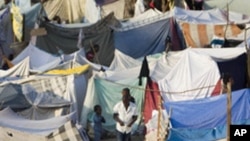The World Health Organization says the risk of epidemics breaking out in earthquake-devastated Haiti is increasing as the rainy season approaches. WHO says it already is receiving reports of a growing number of cases of diarrhea, measles and tetanus.
The World Health Organization says it is worried about an explosion of diseases in Haiti. It says people are at great risk of getting diarrhea, cholera and other water borne diseases because of the bad sanitary conditions and contaminated water.
It says contagious diseases such as measles can spread like wildfire in the overcrowded, squalid resettlement camps.
WHO spokesman Paul Garwood says U.N. agencies and the Haitian government will conduct a campaign next week to immunize hundreds of thousands of children under age five against measles, tetanus and diphtheria.
He says WHO and other aid agencies will be taking additional measures to try to prevent epidemics from breaking out.
"We are very focused on the fact that the rainy and hurricane seasons are on their way," said Garwood. "In response to that, measures that we can take include working with partners such as UNICEF."
"The distribution of clean drinking water to as many people as possible, ensuring that sanitation and hygiene standards are high, particularly in areas where people are living temporarily, establishing early warning systems for disease outbreaks and reports of suspected diseases. This enables up to quickly respond to pockets of suspected cases and to try and bring them under control," he added.
Garwood says there is a critical need for surgeons. He says there are more than 2,000 amputee cases in Haiti as a result of the injuries sustained in the earthquake.
At present, he says an estimated 30 to 100 amputations are being carried out every day. And, it is likely that number will grow.
"Crutches are in very high demand," said the spokesman. "Other critical needs are specialists in orthopedic and internal medicine and X-ray equipment. We also see that post-operation medical supplies and antibiotics remain a key need."
Garwood says the number of trauma cases is declining, but there has been an increase in mental health needs. Unsurprisingly, he says many people are traumatized by the horrible events they've experienced.
He says two WHO mental health specialists will be arriving in Haiti in the coming days to begin an assessment.
WHO: Risk of Epidemics in Haiti Increasing

World Health Organization says people are at great risk of getting diarrhea, cholera and other water borne diseases because of the bad sanitary conditions and contaminated water.











